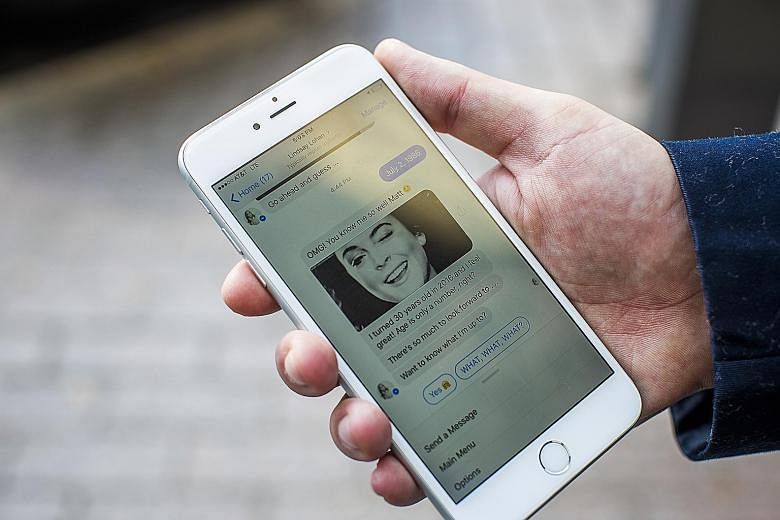NEW YORK • In January, Ms Christina Ausset, a 24-year-old Maroon 5 fan in France, spotted an enticing Twitter post from another of the band's followers: "I just had a conversation with Maroon 5! Awesome!"
The interaction, it turned out, had been conducted on Facebook Messenger with Maroon 5's chatbot - an automated program designed to respond to basic commands.
Not exactly a conversation with Adam Levine, Ausset noted, but it did not matter. She now happily talks to the bot too.
"Having Maroon 5 on Messenger," she wrote in an e-mail, "makes you feel really close to your favourite artists."
For celebrities who use Twitter, Instagram and Snapchat to lend a personal touch to their interactions with fans, the next frontier of social media is an impersonal one: chatbots, a low-level form of artificial intelligence that can be harnessed to send news updates, push promotional content and test new material.
In the music world, "bot" is often a dirty word, conjuring up the tools used by high-tech ticket scalpers. Yet 50 Cent, Aerosmith, Snoop Dogg and Kiss have deputised chatbots as their automatic, ever-alert greeters on Facebook Messenger, handling the flood of inquiries that would overwhelm any human.
When someone connects to Maroon 5 on Messenger, a text bubble pops up: "Hi," it says. "I'm the Maroon 5 bot. Want to be the first to know when we release new music?"
A series of questions with multiple-choice answers follows, leading the fan down a path lined with emojis and video clips.
It is a purposely simple interaction, created via technology developed by a start-up named Octane AI.
Yet even in their programmed responses, chatbots can convey human personality, said Christina Milian, a singer and actress who has been among the earliest proponents of the technology and helped found Persona Technologies, an Octane competitor.
"I feel like it's personal," she said of her chatbot. "It's in my words. It's how I talk. My fans know how I talk."
Not all celebrity bots are quite up to the level of verbal verisimilitude, however. Aerosmith's, for example, responds to virtually every inquiry with "rock on".
But Milian said her bot's intelligence surprised even her. "When I'm communicating with my own chatbot," she said, "sometimes I see something and I'm like, 'Oh, that's so me.'"
The chatbots may also offer a glimpse of the music industry's future, which is beginning to involve virtual-reality concerts, play- list algorithms and virtual assistants such as Amazon's Alexa, said Ms Cortney Harding, a consultant to music technology companies and the author of How We'll Listen Next: The Future Of Music From Streaming To Virtual Reality.
"As AI develops, everything is going to go into a mixed-reality world," she said, "where you could dial a hologram of your favourite pop star and have 'real conversations' with the artificially intelligent version of that person."
Octane AI, founded about a year ago, is one of a handful of technology companies tailoring these programs to the entertainment industry, with clients including Interscope Records, the label behind Maroon 5 and 30 Seconds To Mars.
Mr Matt Schlicht, Octane AI's chief executive, said that with more than one billion users, Messenger - the chat app connected to Facebook - was too large for celebrities to ignore. And once they are paying attention, his company's bots can help them make efficient use of it.
Chatbots have become a common part of online interaction for major consumer companies. Domino's, for example, lets customers use one to order a pizza. They have spread since last April, when Facebook made it possible for developers to build bots on Messenger.
Octane AI's clients say response rates to its chats are extraordinarily high. According to the company, when its bots send a new notification, 50 to 75 per cent of its subscribers open the message and click a link within 10 minutes.
Bots have become popular for musicians even though they have been slow to catch on overall. At a conference in September last year, a Facebook executive called the technology "overhyped" and said that early examples were unimpressive.
Still, Milian said her Messenger account had attracted two million people since she introduced her bot in October.
Maroon 5 also demonstrated its value for commercial research. In February, a day before the band released their single Cold, they sent a short clip of the song to their chatbot followers. Within 24 hours, fans sent 100,000 messages to the bot and shared the clip on social media.
Chatbots' high engagement rates may be helped by their novelty. But as they spread, they will have to be reconciled with the sour perception of bots among the general public, which has been building for years because of the use of bots in fake social-media accounts and, especially, ticketing.
Bots have become such a scourge in the global scalping market that last year, former United States president Barack Obama signed a federal bill outlawing their use in buying event tickets.
NYTIMES

